Recovering from surgery, whether it's a major procedure like hip replacement or something as common as dental surgery, can be a daunting journey. As a holistic nutrition specialist and coach, I am here to share how the right nutrition and supplements for healing after surgery can significantly impact the recovery process. Through personal experiences and extensive research, I've discovered a treasure trove of essential nutrients that support wound healing and enhance the body's natural healing abilities.
Jump to:
- The Healing Process and the Role of Good Nutrition
- Essential Nutrients for Post-Surgery Recovery
- Supplements for Healing After Surgery
- Foods to Include in Your Surgical Recovery Diet
- Supplements to Avoid Before and After Surgery
- Integrating Supplements into Your Treatment Plan
- Supporting the Body's Natural Healing Process
- More Supplement Info
- FAQ's
- Final Thoughts
- Comments
Over the years, I have had many clients ask about the best dietary supplements for post-surgical recovery. This is certainly a worthy question to ask. Another question is: What supplements should I avoid before surgery?
Years ago I got dry sockets after dental surgery due to certain supplements I was taking. They were natural blood thinners, which prevented the clots from forming properly. It was so painful! If only I knew back then to stop taking those supplements a few days before surgery, I could have avoided the experience.
I now emphasize the importance of understanding which supplements aid healing and which ones to avoid, especially around surgeries.
In this article, we'll navigate the crucial role of a balanced diet and specific supplements in accelerating the healing process. We'll explore how nutrients can boost immune function, strengthen connective tissue health, manage joint pain by facilitating a healthy inflammatory response, and even improve the appearance of scars.
The key lies in integrating a mixture of whole foods and targeted supplements into your diet.
Additionally, we'll cover how certain nutrients can be a powerful tool in pain management and physical therapy. Whether you're preparing for an upcoming surgery or during a recovery period, understanding the impact of good nutrition and the right dietary supplements is essential for proper healing.
However, it's crucial to remember that this article is not intended to replace medical advice. Before adding any supplement to your treatment plan, always consult with your healthcare provider. This piece is meant to share insights from my journey and studies, offering a glimpse into the potential of nutrition in the surgical recovery process.
Jump to:
- The Healing Process and the Role of Good Nutrition
- Essential Nutrients for Post-Surgery Recovery
- Supplements for Healing After Surgery
- Foods to Include in Your Surgical Recovery Diet
- Supplements to Avoid Before and After Surgery
- Integrating Supplements into Your Treatment Plan
- Supporting the Body's Natural Healing Process
- More Supplement Info
- FAQ's
- Final Thoughts
- Comments
The Healing Process and the Role of Good Nutrition
Beginning the inevitable journey of recovery after surgery, the role of a healthy diet cannot be overstated.
Good nutrition plays an essential role in the body's ability to heal. It's not just about calorie intake; it's about choosing the right nutrients that aid in the healing process.
Nutritious foods are the foundation for rebuilding and repairing tissues. This makes them a valuable asset in reducing recovery time.
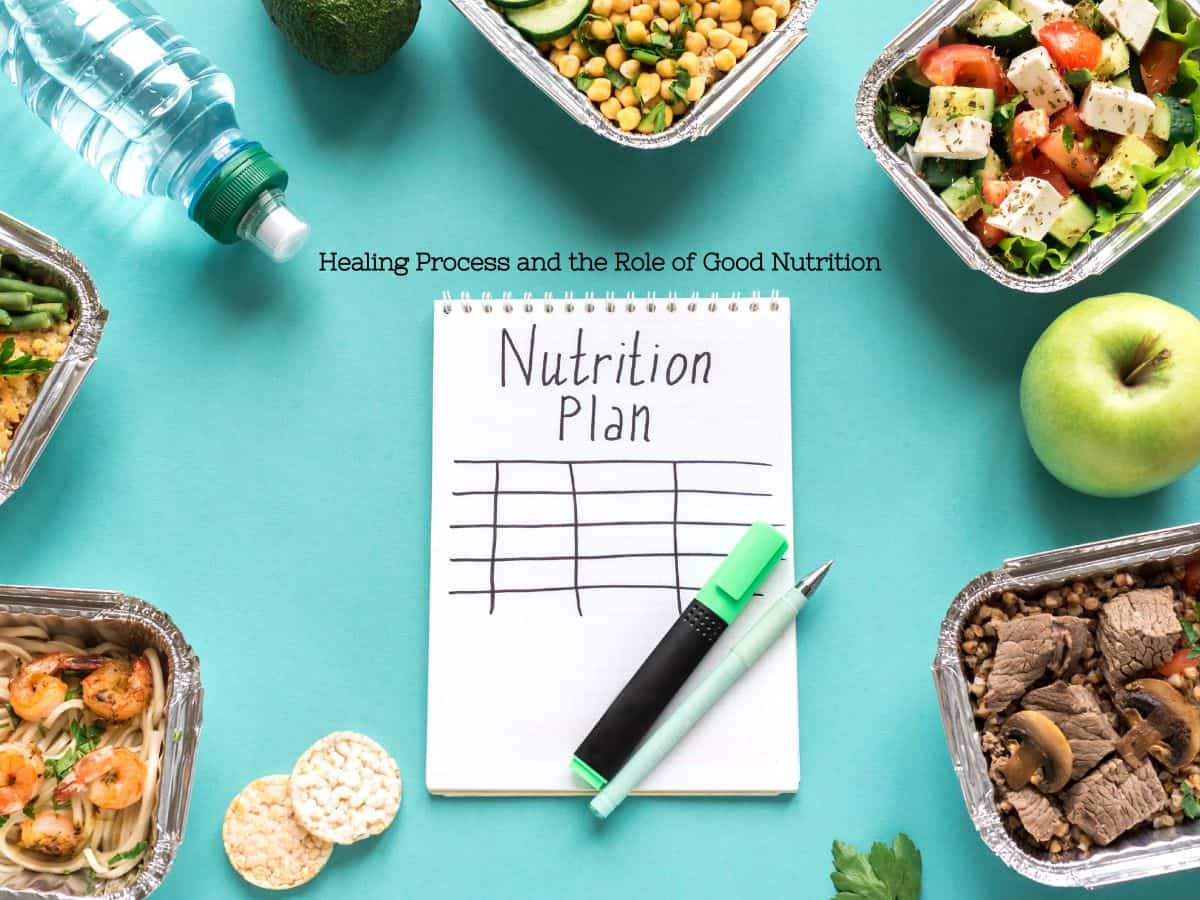
Key nutrients like Vitamin C and Vitamin E are crucial for collagen production, a vital component in wound healing. These vitamins, found in various food sources, also help combat oxidative stress, which can impede the healing process. Meanwhile, Vitamin D and Vitamin K play an important role in bone health and the regulation of inflammatory responses.
Fatty acids, especially omega-3s, are known for their anti-inflammatory properties.
Including healthy fats in your diet enhances immune system function and promotes faster healing.
Protein intake is another cornerstone of post-surgery nutrition. Proteins are the building blocks of tissue repair. Ensuring adequate protein in your diet supports muscle and tissue repair, significantly impacting recovery time.
It's also vital to monitor blood sugar levels. High blood sugar can slow down the healing process, It is essential to choose nutritious foods over fast food and high-sugar options.
Good nutrition means maintaining a balanced diet, rich in vitamins, minerals, and other key nutrients.
Lastly, don't underestimate the importance of water intake. Staying hydrated is fundamental for all bodily functions, including the healing process. Water plays an essential role in transporting nutrients and removing waste from the body, both critical during recovery.
Essential Nutrients for Post-Surgery Recovery
After a surgical procedure, the body undergoes a complex healing process, demanding specific nutrients for optimal recovery. Understanding these essential vitamins and minerals, and their roles in the body, is key to facilitating a swift and healthy recovery from surgical wounds.
Essential Amino Acids are crucial for tissue repair and immune system function. They play a significant role in healing and reducing the recovery time.
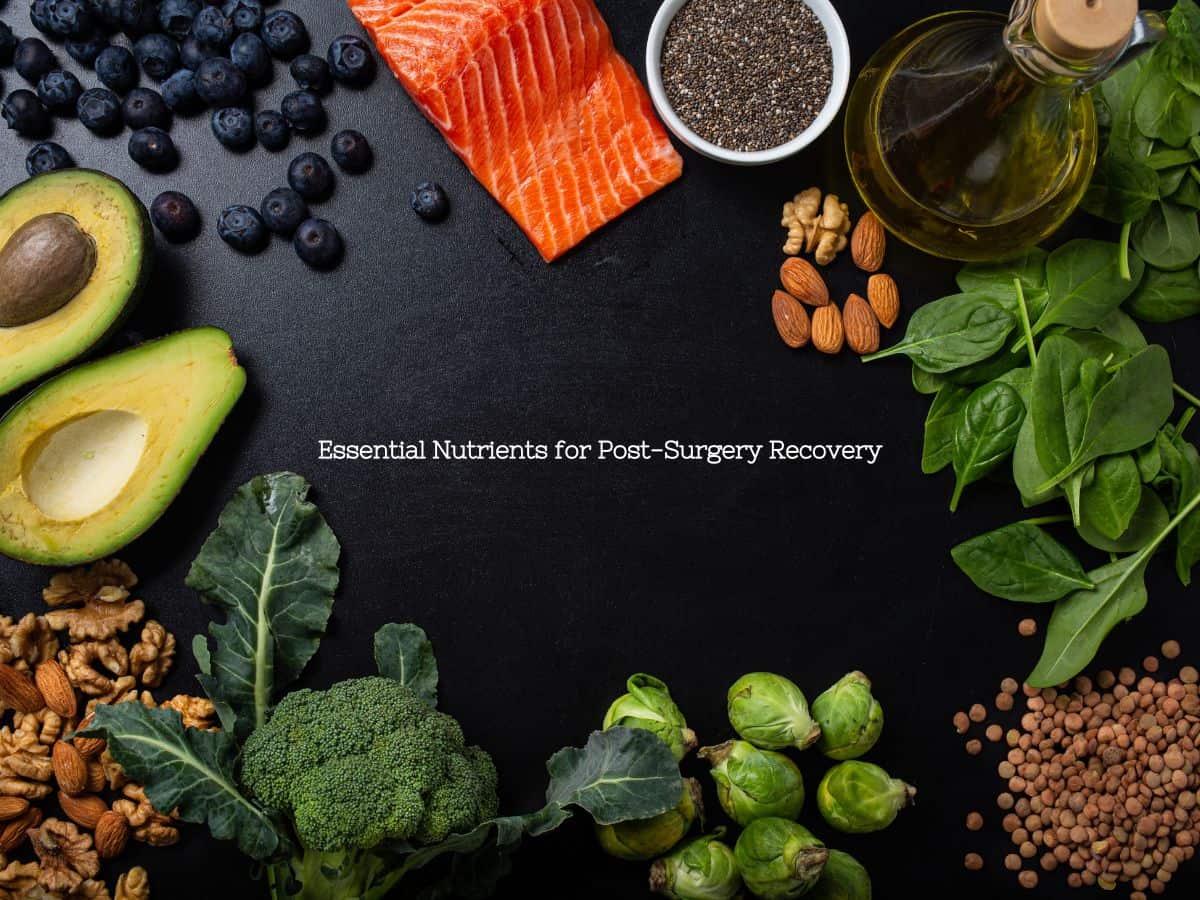
Protein and BCAAs play a pivotal role in protein synthesis, crucial for repairing tissue damage. Amino acids, the building blocks of protein, are necessary for forming new tissue, including skin and muscle.
Vitamin C, known as a powerful antioxidant, is essential for collagen formation, vital for the healing of surgical wounds. It also enhances immune response and white blood cell function, lowering the risk of infection.
Zinc, an essential mineral, plays a major role in wound healing and immune function. Zinc deficiency can slow the healing process, making it crucial to consume enough zinc-rich foods.
It also aids in maintaining strong bones and healthy blood vessels, promoting better blood flow to the healing areas.
Vitamin A is vital for cell growth and immune function. It helps to repair tissue damage and maintain healthy skin, reducing the risk of infection at surgical sites.
B Vitamins, particularly B6 and B12, play an essential role in energy levels and nerve function. They are essential in the recovery period, helping to maintain energy and reduce fatigue.
Iron is crucial for hemoglobin production, which transports oxygen in the blood. Adequate iron levels ensure sufficient blood flow to the wound area, facilitating faster healing and reducing the risk of infection.
Omega-3 Fatty Acids, found in fish oil and flaxseeds, help reduce inflammation, which is beneficial in healing surgical wounds and minimizing tissue damage.
These nutrients are commonly found in helpful supplements for healing after surgery.
Supplements for Healing After Surgery
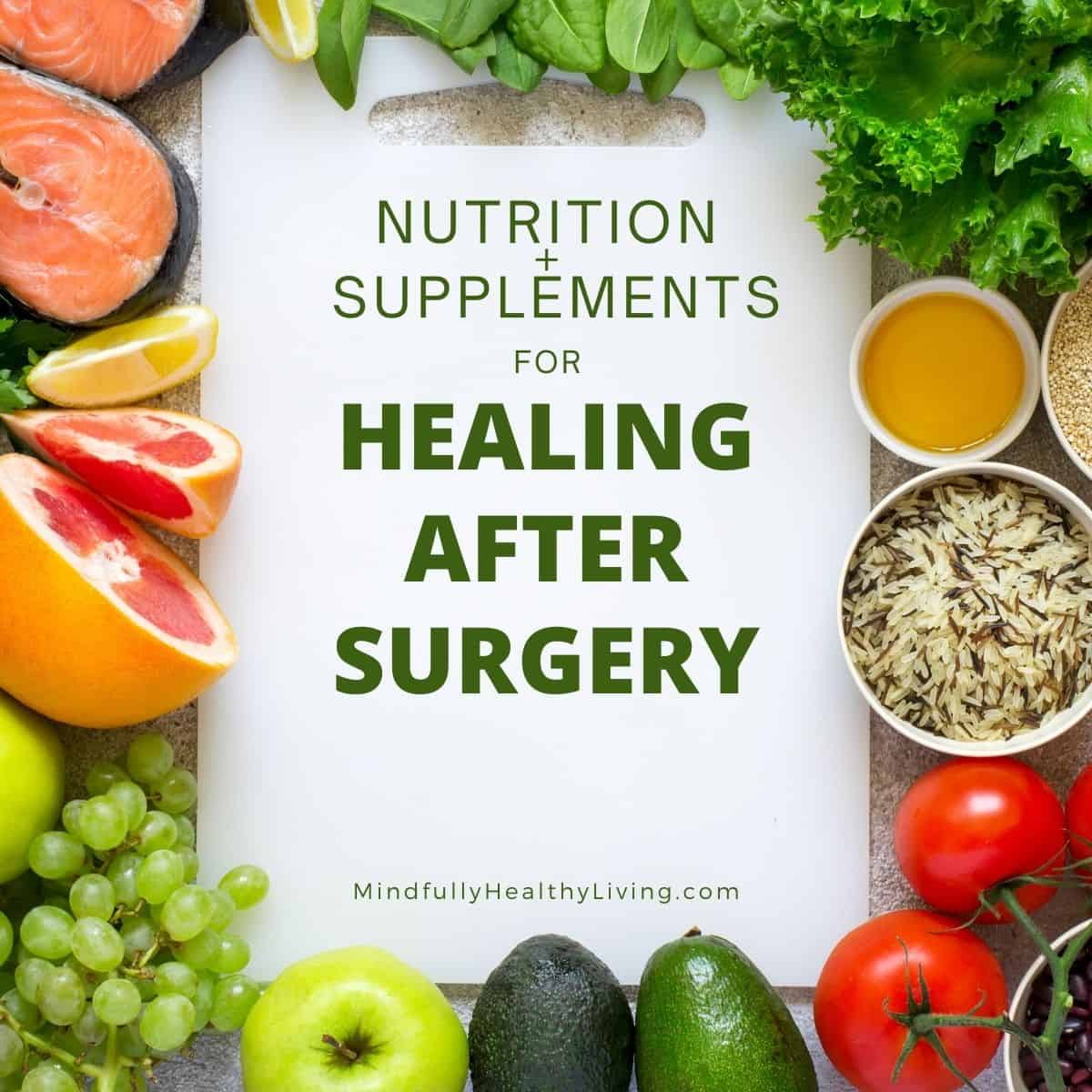
Recovering from surgery requires careful attention to the body's nutritional needs. Supplementing your diet with specific nutrients can significantly aid bone health, joint pain relief, and muscle repair.
Liposomal Vitamin C: This form of Vitamin C is highly bioavailable, making it more efficient for the body. It's crucial for collagen production, wound healing, and bolstering the immune system, ensuring a more robust and swift recovery.
Zinc Supplement: Zinc is vital for wound healing and immune function. Supplementing with zinc helps reduce scar formation and accelerates the healing of surgical wounds.
Fish Oil: Rich in omega-3 fatty acids, fish oil supplements are beneficial for their anti-inflammatory properties. They can aid in the reduction of joint pain and support overall recovery.
Multivitamins: A high-quality multivitamin, like Pure Encapsulations O.N.E., can be beneficial. This particular brand is free from common additives and is packed with essential nutrients, including methylated B vitamins for better absorption. It is one of the best multivitamins I have found!
Arnica Montana: As a homeopathic remedy, arnica is widely used for its efficacy in reducing bruising and swelling post-surgery. It's available both in topical forms and as oral supplements. It works quite well!
Manuka Honey and Colloidal Silver: In our family, we rely on Manuka honey and colloidal silver for wound care. Manuka honey's natural antibacterial properties make it excellent for healing, while colloidal silver aids in the recovery process. These natural supplements help speed healing for an open wound that occurs after everything from a small procedure to a major surgery.
*For those interested in understanding more about Manuka honey, check out our comprehensive guide on how to choose the right Manuka honey, explaining MGO vs UMF and identifying the best type for your needs.
Natural Antibiotic Herbs: Including herbs with natural antibiotic properties in your recovery regimen can further prevent infection and promote healing. Check out our article on natural antibiotic herbs and supplements. Also, consider our article discussing elderberry vs echinacea.
Bromelain: Found in pineapples, especially the pineapple core, this enzyme is known for reducing swelling and bruising, and can be taken as a supplement or obtained directly from the fruit.
It's essential to discuss any new supplement with your healthcare provider to ensure they align with your overall recovery plan.
Foods to Include in Your Surgical Recovery Diet
Recovering from surgery requires more than just time; it needs the right nutrition. A balanced diet, rich in whole foods, can significantly enhance the healing process and reduce recovery time.

Lean Meats and Organic Proteins: Essential for tissue repair, lean meats like chicken and turkey are protein-rich foods. Opting for organic, grass-fed meats and eggs provides the body with cleaner, more beneficial proteins.
Fatty Fish: Foods like salmon are rich in omega-3 fatty acids, which are crucial for reducing inflammation. Including fatty fish in your diet can speed up the recovery process by helping to minimize inflammation.
Whole Grains and Seeds: Superfoods such as chia seeds, flax seeds, and hemp seeds are rich in fiber and essential nutrients. They contribute to a balanced diet, aiding in digestive health, which is vital during recovery.
*Check out our guide hemp vs chia vs flax seeds.
Vegetables and Fruits: Packed with vitamins, minerals, and antioxidants, fresh fruit and dark leafy greens support the immune system and reduce inflammation. Citrus fruits are especially rich in vitamin C. A variety of colorful vegetables and fruits in your diet maximizes nutritional intake as you receive the beneficial phytonutrients from naturally colorful foods.
Healthy Nuts: Nuts like almonds, walnuts, and pistachios provide healthy fats and proteins, essential for sustained energy and tissue repair.
Dairy Products: If you choose to include dairy in your recovery diet, opting for organic and grass-fed options is best as they are less likely to contain hormones and antibiotics.
Tart Cherry Juice: This juice is known for its anti-inflammatory properties and can help reduce pain and muscle soreness, making it a beneficial addition to your recovery diet. Check out my article on tart cherry juice vs capsules!
Supplements to Avoid Before and After Surgery
When preparing for surgery, it's crucial to consider not just the medications you're taking, but also any dietary supplements. Certain supplements can have adverse effects on the surgical process and recovery.
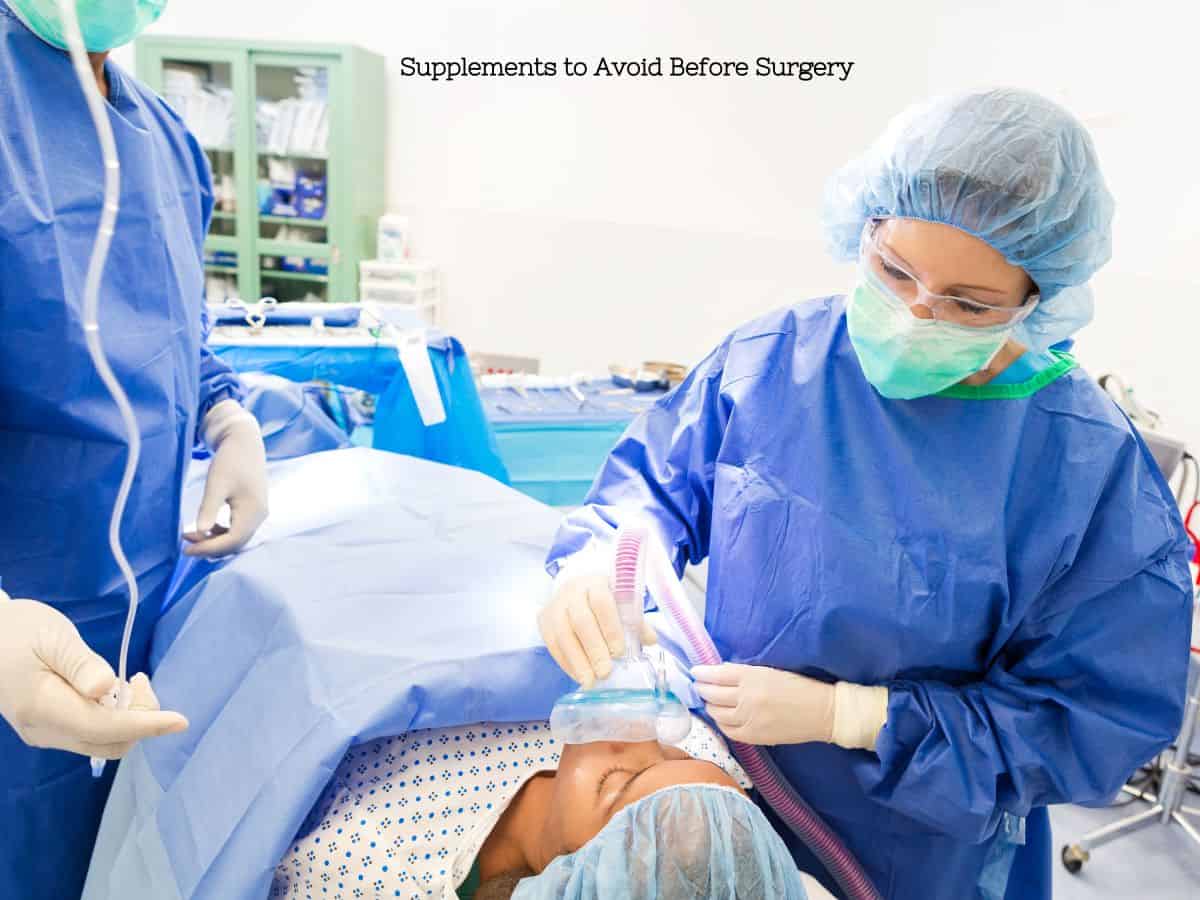
Blood-Thinning Supplements: Supplements like fish oil, turmeric, and moringa are known for their blood-thinning properties. While beneficial in some contexts, they can increase the risk of bleeding during and after surgeries, including procedures like knee replacement, tumor removal, or cosmetic surgery. I love these supplements, but wait a few days after surgery to start them. It's vital to have a blood test and consult with your healthcare provider about these supplements.
Vitamin E: Often taken for its antioxidant properties, Vitamin E can also thin the blood. It's often recommended to stop taking Vitamin E supplements a few weeks before any surgical procedure.
Garlic and Ginger: Both are natural blood thinners. Regular intake of garlic or ginger supplements might increase bleeding risk during surgery.
Ginkgo Biloba: Popular for its memory-enhancing effects, Ginkgo Biloba can also affect blood clotting. It’s advisable to discontinue its use before surgery to prevent excessive bleeding.
St. John’s Wort: Known for its use in treating depression, St. John's Wort can interfere with anesthesia and other medications used during surgery.
Echinacea and Ginseng: These can alter the immune response of the human body, potentially affecting the healing process and white blood cell function.
It's critical to disclose all supplements, not just prescription medications, to your healthcare provider before any surgical procedure. Always have a thorough discussion with your healthcare provider to understand the best course of action for your specific health needs.
Integrating Supplements into Your Treatment Plan
When it comes to incorporating supplements into your treatment plan, consulting with healthcare providers is paramount. Every individual's body responds differently to supplements, and what works for one person may not be suitable for another. This personalized approach is something I've learned through both professional experience and personal practice.
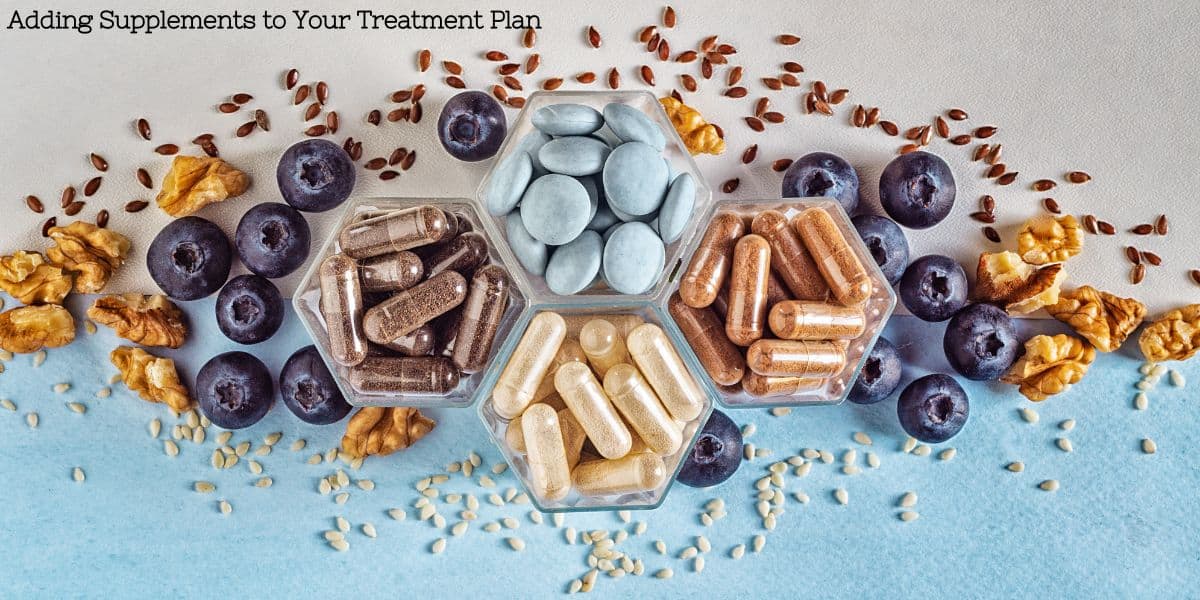
Before adding any supplements to your regimen, it's important to discuss them with your doctor, especially if you are undergoing treatment for specific conditions.
For instance, as a holistic nutritionist, I've seen cases where certain supplements could interact with medications or affect medical conditions in unexpected ways.
A healthcare provider can help evaluate these risks based on your medical history and current medications.
It's also important to remember that more isn't always better.
The right dosage and combination of supplements can make a significant difference in their effectiveness.
Personalized advice from a healthcare professional ensures that you're not just taking supplements, but taking the right ones for your specific needs.
Additionally, nutrient sourcing and quality can make a big difference.
Supporting the Body's Natural Healing Process
The body's ability to heal itself is remarkable, and nutrition plays a crucial role in this process. Through my experience in holistic nutrition, I've seen firsthand how the right foods and supplements can dramatically enhance the body's natural healing abilities.
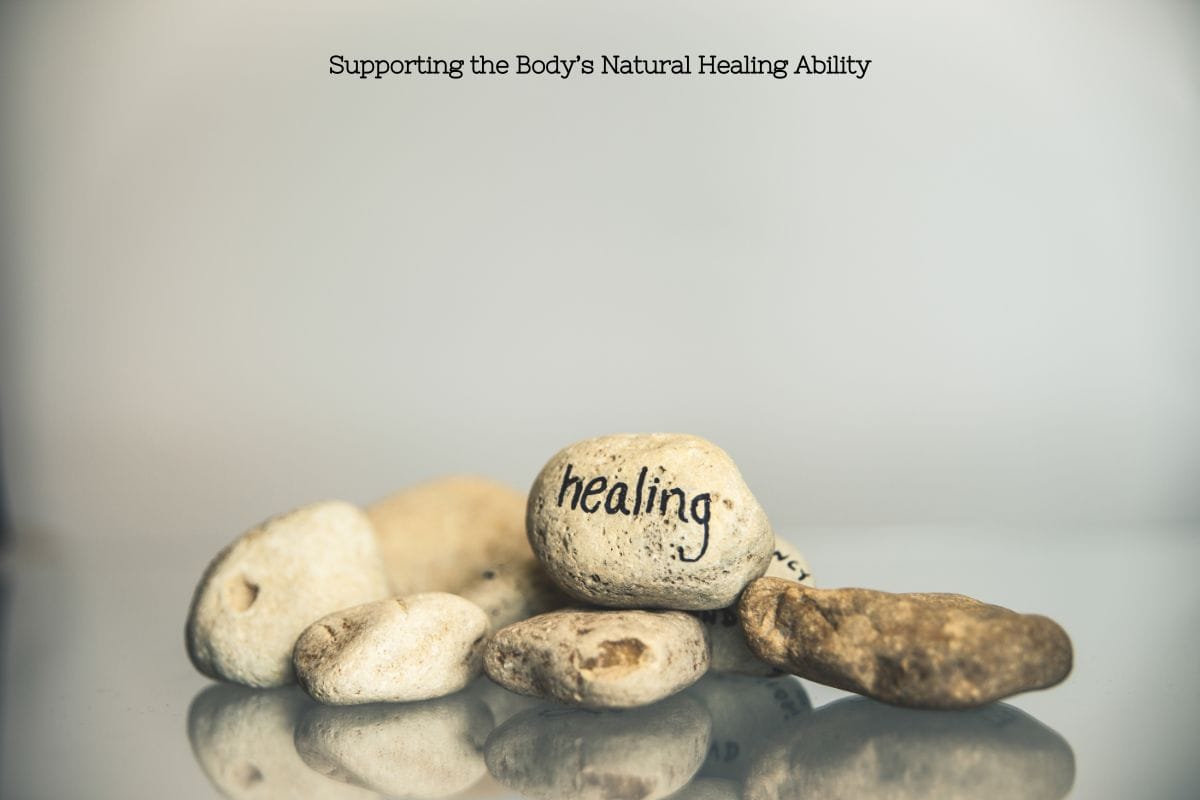
Incorporating a balanced diet rich in vitamins, minerals, and antioxidants supports the immune system and aids in tissue repair. Foods rich in omega-3 fatty acids, like fatty fish, can help reduce inflammation, while protein-rich foods like lean meats and legumes are essential for repairing and building tissues.
Supplementation can also play a significant role in this process. For example, a high-quality multivitamin can fill any nutritional gaps in your diet, ensuring your body gets all the nutrients it needs.
Additionally, supplements like turmeric and ginger, known for their anti-inflammatory properties, can aid in pain management and enhance the effectiveness of physical therapy.
As someone who has embraced natural healing methods, I can attest to the benefits of using nutrition and supplements wisely. After a car accident, integrating a balanced diet and specific supplements like fish oil, moringa, and vitamin C significantly accelerated my recovery and eased the pain during physical therapy sessions.
Remember, every body is unique, and what works for one person may not work for another. Always consult with a healthcare provider to tailor a nutritional and supplement plan that aligns with your body's specific needs and your overall health goals.
It may also be helpful to quit smoking if you smoke, we have a helpful article outlining foods and herbs that help clear nicotine from the body!
More Supplement Info
FAQ's
Supplements that are often recommended to support healing after surgery include vitamin C for collagen formation and immune support, zinc for wound healing and immune function, and B vitamins for energy and cell repair. Protein supplements can also be beneficial, as protein is essential for tissue repair. Omega-3 fatty acids from fish oil may help manage inflammation. However, always consult with your healthcare provider before starting any new supplement.
The timing to resume supplements after surgery varies depending on the type of surgery and the supplement in question. It's essential to get the go-ahead from your healthcare provider, as they will advise based on your circumstances and the specific supplements you wish to take. Generally, you may need to wait until your doctor confirms that it's safe to reintroduce supplements, especially if they could affect blood clotting or interact with medications.
Final Thoughts
As we conclude this journey by understanding the role of nutrition and supplements in post-surgery healing, it's clear that recovery is a multifaceted process. Proper nutrition, the right supplements, and holistic practices like yoga, reiki, and sound therapy can significantly influence your healing journey. Remember, every step you take towards nurturing your body and mind plays a crucial role in your overall well-being.
👉 What has helped you in your wound healing and surgery recovery? Do you have any experiences or tips to share? Your insights could be invaluable to others on a similar journey. Feel free to comment below with your stories or any other thoughts you'd like to share.
Subscribe to our newsletter for weekly healthy recipes and nutrition tips!
Here's to your health and a swift, holistic recovery. We're here to support you every step of the way.


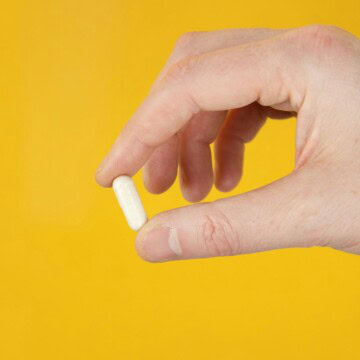
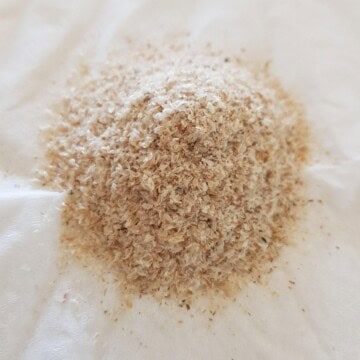
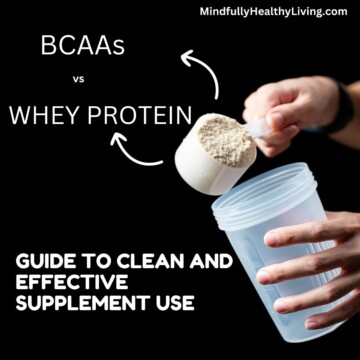


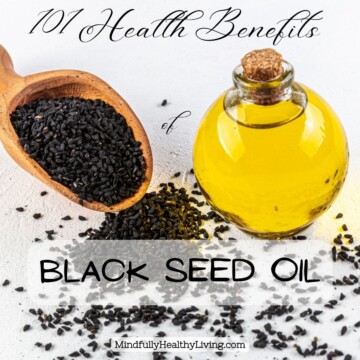
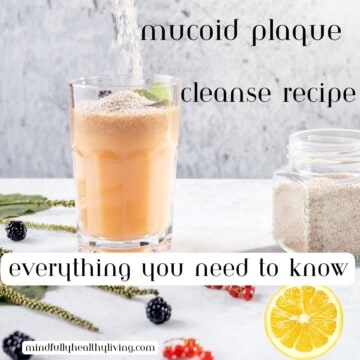

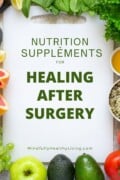
Century Foods says
Thanks for sharing this very well-written and worth-reading article.
Wish to see more in the coming days.
Natalie Perry says
You are quite welcome. Thank you 🙂